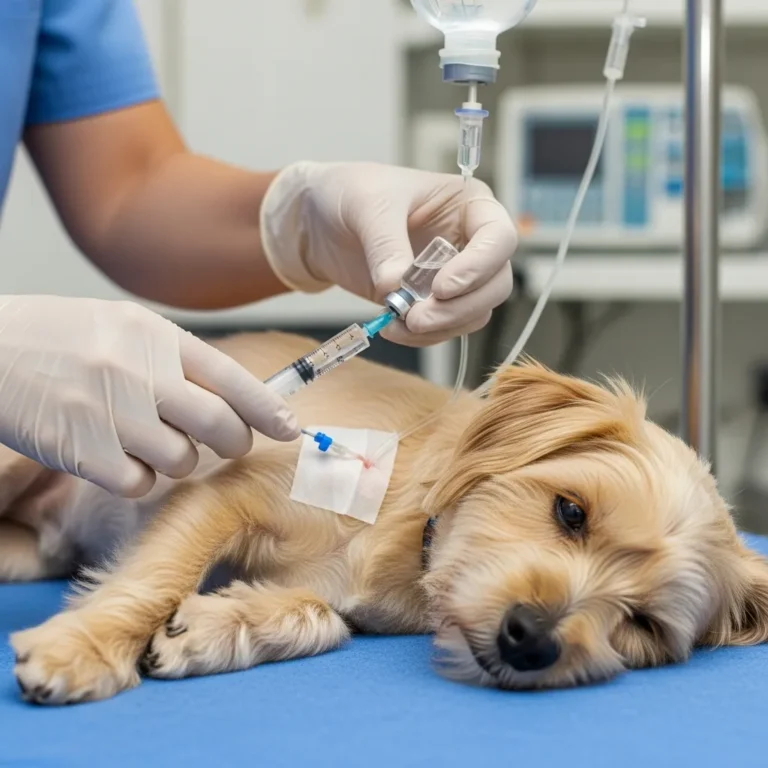
what hge in dogs
Paws crossed, everyone! It’s your favorite dog-blogger pal, coming at you with a topic that’s a little heavy, but oh-so-important. Have you ever been playing fetch in the backyard, everything seems perfect, and then bam—your furry best friend suddenly isn’t themselves? I’m talking about those moments that make your heart drop into your stomach: seeing your pup lethargic, or worse, discovering a mess of bloody diarrhea.
It’s terrifying, and it’s a scenario that introduced me to the scary world of HGE, or Hemorrhagic Gastroenteritis. I went through this with my curious Beagle, Barnaby, a few years back, and let me tell you, I’ve never moved so fast in my life. That vet trip was a blur of worry.
But here’s the good news: we got through it, and you can too. Knowledge is power, my friend! This guide is like us sitting down for a coffee (or a puppuccino) while I walk you through everything I wish I’d known about HGE. We’ll break down the scary jargon, talk about what to do in a panic moment, and how to help your pup bounce back. So, take a deep breath, give your doggo a gentle scratch behind the ears, and let’s get into it. You’ve got this, and I’m here to help.
Understanding HGE in Dogs
According to American Kennel Club:
Alright, let’s demystify this. Imagine your dog’s digestive system is a happy, well-organized, and super-efficient picnic. Everything is digesting smoothly, nutrients are being absorbed, it’s a great day. When HGE hits, it’s like a tornado ripping through that picnic. The “hemorrhagic” part simply means there’s bleeding involved, and “gastroenteritis” is a fancy word for inflammation of the stomach and intestines. So, HGE is basically a sudden, severe inflammatory tornado in your dog’s gut that causes bleeding. It’s not just a little tummy rumble; it’s a five-alarm fire that needs immediate attention.
What is HGE in Dogs?
According to American Kennel Club, In simple, dog-mom terms, HGE is an acute (that means sudden and severe) condition where your dog’s digestive system goes into full revolt. The main signs are explosive vomiting and bloody diarrhea. The real danger isn’t just the ick factor—it’s the speed. This condition can cause such rapid fluid loss that your dog can become dangerously dehydrated, leading to shock, in a matter of hours.
What’s happening inside? The lining of their intestines, which is normally a strong barrier, becomes leaky. Fluid and blood seep out into the gut, which is why you see that horrifying output. It’s your dog’s body having a massive, uncontrolled inflammatory response.
HGE is one of those conditions where minutes matter. The rapid onset of symptoms, particularly the bloody diarrhea, should trigger an immediate visit to the emergency vet. It’s not something to ‘wait and see’ with.” Trust me, I learned that the hard way.
What are the Main Symptoms of HGE in Dogs?
According to American Kennel Club and webMD :
Knowing what to look for is your superpower. The symptoms of HGE come on fast and furious. Keep an eye out for this combo:
- Sudden, Frequent Vomiting: This often kicks things off. It’s not just a one-and-done puke; it’s persistent.
- Bloody Diarrhea (The Hallmark Sign): This is the big, scary red flag (literally). It can look like bright red blood, or it can have a distinct, grotesque “raspberry jam” consistency. It’s often very watery and can be projectile.
- Major Lethargy: Your usually zoomie-loving pup will be a limp noodle. They might not even want to lift their head.
- Obvious Abdominal Pain: They might whine, look at their belly, or tense up when you try to touch them.
- Dehydration: You might notice dry, sticky gums, sunken eyes, and if you gently pinch the skin on their back, it doesn’t snap right back into place.
- Total Loss of Appetite: They’ll turn their nose up at their favorite kibble and even water.
If you see this cluster of symptoms, especially the bloody stool, it’s time to drop everything and get to the vet. No waiting, no Googling—just go.
Is HGE the Same as Gastroenteritis? What’s the Difference?
According to American Kennel Club and webMD :
This is a fantastic question! Think of it this way: “Gastroenteritis” is the big umbrella category for “my dog’s stomach and intestines are upset.” It can be caused by eating garbage, a new treat that didn’t agree with them, stress, or parasites. Most cases are mild and pass without much drama.
HGE, however, is the most intense, severe form under that umbrella. The key difference is the “H”—the hemorrhagic, bloody part, and the terrifying speed of dehydration. While both involve tummy troubles, HGE is a specific, critical emergency. So, all HGE is gastroenteritis, but not all gastroenteritis is HGE.
What Does HGE Vomit and Diarrhea Look Like?
According to American Kennel Club and webMD :
Let’s get real for a second, because this is how you’ll know. It’s not pretty, but recognizing it is crucial.
- The Vomit: It might start as food or yellow bile. As things progress, it can have blood in it, which might look like fresh red streaks or resemble coffee grounds (that’s digested blood).
related :Why Is My Dog Vomiting White Foam? Causes, treatment - The Diarrhea: This is usually the most alarming part. It’s often voluminous, watery, and can be shot across the room. The blood can be bright red and obvious, or it can be that dark, jelly-like “raspberry jam” I keep mentioning. Sometimes, it can look like almost pure blood. It’s shocking, and it’s your cue to act.
How is HGE Diagnosed by a Vet?
According to American Kennel Club and webMD :
Your vet is going to move quickly. They’ll likely do a combination of things to piece the puzzle together:
- Your Story is Key: They’ll listen carefully to you describe the sudden onset of symptoms. The “raspberry jam” diarrhea story is a huge clue.
- Hands-On Exam: They’ll check for dehydration, abdominal pain, and your dog’s overall responsiveness.
- The Packed Cell Volume (PCV) Test: This is a star player in diagnosing HGE. It’s a simple blood test that measures the percentage of red blood cells. With HGE, all that fluid loss makes the blood super concentrated, so the PCV is sky-high (often over 60%, when normal is 35-55%). This is a classic HGE trademark.
- Full Blood Work: This checks electrolytes and organ function to see how much strain your pup is under and to rule out other issues like pancreatitis.
- Fecal Test: To make sure pesky parasites like Giardia aren’t the real culprits.
- Imaging: An X-ray or ultrasound might be used to double-check that your pup didn’t swallow a sock or toy that’s causing a blockage.
It’s all about confirming HGE and ruling out other problems that need different treatments. That high PCV is often the final piece of the diagnostic puzzle.
Causes and Risk Factors
Here’s the frustrating part for us doting pet parents: often, we never find out the exact “why.” It’s what vets call “idiopathic,” which is a fancy word for “we don’t know for sure.” But there are some strong theories and known risk factors.
What Causes HGE in Dogs?
According to American Kennel Club and webMD :
While the precise trigger is a mystery, the suspects often include:
- Bacterial Bad Guys: Certain bacteria, like Clostridium perfringens, might produce toxins that seriously irritate and damage the gut lining. It’s not a simple infection, which is why antibiotics aren’t always the main fix.
- Dietary Indiscretion (Aka, Getting Into Stuff): Did your dog sneak a bite of something gnarly from the trash? Or snag some rich, fatty human food? This is a super common precursor, though not every dog who raids the trash gets HGE. It might be the final straw for a susceptible pup.
- Stress: Big changes like moving, boarding, or a new family member can sometimes be a trigger. A dog’s gut is very connected to their brain, just like ours!
- Hyperactive Immune Response: In some dogs, the immune system in the gut might just overreact to something, causing massive inflammation.
We often see a correlation with sudden dietary changes or stress, but it’s not a direct cause-and-effect. It’s more likely a combination of factors, perhaps in a genetically predisposed dog, that tips the delicate balance of the gut into this severe inflammatory state.
Are Certain Breeds More Prone to HGE?
According to American Kennel Club and webMD :
HGE can happen to any dog, but it does seem to have a type. Smaller, toy breeds are statistically more likely to experience it. The usual suspects include:
- Miniature Poodles
- Dachshunds
- Miniature Schnauzers
- Yorkshire Terriers
- Cavalier King Charles Spaniels
But don’t let your guard down if you have a Labrador or a Shepherd! It can happen to them, too; it’s just less common.
Can Stress Cause HGE in Dogs?
According to webMD :
The link is more “associate” than “proven cause,” but many vets (and I, from my experience with Barnaby after a stressful kennel stay) see a connection. Stressful events like:
- A stay at a boarding kennel
- A big move to a new house
- A noisy party or construction in the home
- The loss of a furry or human family member
…can sometimes precede an HGE episode. Stress messes with gut health, so it makes sense that it could be the final push for a dog already on the edge.
Is HGE Contagious to Other Dogs or Humans?
According to American Kennel Club and webMD :
Take a deep sigh of relief, because this is great news: No, HGE itself is not considered contagious. You can’t catch it from your dog, and your other dogs in the house are very unlikely to catch it from their sick sibling.
Now, if the specific trigger for a particular case was a nasty parasite or a specific bacteria (which is usually ruled out in an HGE diagnosis), then that specific bug could be contagious. But the condition of HGE itself doesn’t spread from dog to dog. So, no need for a full quarantine—just use common-sense hygiene like washing your hands after cleanup.
hge in dogs treatment
Okay, deep breath. This is the part where we talk about solutions, and the news is really good. With fast, aggressive vet care, most pups make a full and fantastic recovery. The keyword is fast.
How is HGE Treated by a Veterinarian?
According to American Kennel Club and webMD :
Treatment is all about support—giving your dog’s body what it needs to fight back and heal. The absolute non-negotiable cornerstone is:
- Aggressive IV Fluids: This is literally life-saving. Your dog will be put on an IV drip to flood their system with fluids and electrolytes, combating that deadly dehydration and preventing shock. This almost always means a stay in the hospital.
- Fantastic Anti-Nausea Meds: Drugs like Cerenia are magic for stopping the vomiting cycle. This lets their stomach settle and stops further fluid loss.
- Antibiotics: Since the gut barrier is compromised, vets often use broad-spectrum antibiotics as a preventative measure against secondary infections that could sneak in.
- Gut Protectors: Medications like sucralfate can be given to coat the raw, inflamed stomach and intestinal lining, like a soothing balm.
- Pain Relief: Because no one should have to endure a belly ache that severe, your vet will provide safe pain management.
- Resting the Gut: Food and water are usually withheld for the first 24-48 hours to let the digestive tract take a complete break.
“Aggressive fluid therapy is non-negotiable for HGE. It’s what keeps them from crashing.” And he’s so right.
What is the Prognosis for Dogs with HGE?
This is the best part: the prognosis is excellent with prompt treatment. The vast majority of dogs bounce back completely and are their happy, waggy-tailed selves within a few days. However, without treatment, HGE can be fatal due to the devastating dehydration and shock. This is why speed is everything.
How Long Does it Take for a Dog to Recover from HGE?
According to PDSA and Merck Veterinary Manual and VCA Animal Hospitals:
The intense, in-hospital phase typically lasts 1 to 3 days. Once your pup is rehydrated, has stopped vomiting, and is starting to show interest in the world again, they’ll get to come home!
The home recovery involves:
- Symptom Watch: No more vomiting or bloody diarrhea. Poop will slowly firm up.
- Energy Return: You’ll see that sparkle come back into their eyes and a wiggle return to their walk.
- Slow Food Re-introduction: This is a critical step you have to follow to the letter.
Full recovery at home usually takes about a week. Don’t rush it!
What Kind of Diet Should a Dog with HGE Be On?
According to PDSA
Your vet will give you a specific plan, but it generally goes like this:
- Start with a Super Bland Diet: After the fasting period, you’ll begin with tiny, frequent meals of something like boiled, skinless chicken breast and plain white rice, or a prescription gastrointestinal diet from your vet.
- Tiny Portions, Lots of Times: Think a tablespoon every 2-3 hours. You’re gently waking the system up, not feeding a feast.
- Gradually Increase: Over several days, if all goes well, you can make the meals a little bigger and a little less frequent.
- The Slow Switch Back: After a week or so on the bland diet, you’ll slowly mix their regular food back in over another 5-7 days.
Patience is key here! Rushing this can cause a major setback.
related: Bland Diet for Dogs with Diarrhea or Colitis & pancreatitis
Are There Any Home Remedies for HGE?
According to PDSA and Merck Veterinary Manual and VCA Animal Hospitals:
I’m going to be very, very clear here, from one dog lover to another: There are no safe or effective home remedies for HGE. None. Zero.
HGE is a dire medical emergency that requires intravenous fluids and strong prescription medications. Trying to treat it at home with pumpkin, rice water, or anything else you find online is a dangerous gamble that could cost your dog their life. By the time you see the bloody diarrhea, the clock is ticking. If you suspect HGE, your only job is to get to the vet immediately.
related: bloody stool canine: Causes & Care
Prevention and Long-Term Care
According to PDSA and Merck Veterinary Manual and VCA Animal Hospitals:
While we can’t put our pups in a protective bubble, we can definitely stack the odds in their favor for a healthy gut future.
Can HGE Be Prevented?
Since the cause is often unknown, we can’t guarantee prevention, but we can be smart about risk reduction:
- Be a Stress-Buster: Try to keep your dog’s routine consistent. For known stressors like thunderstorms or vet visits, talk to your vet about calming aids like Adaptil diffusers or supplements.
- Stick to a Great Diet: Feed a high-quality, consistent diet. No sudden food switches! If you must change, do it over 7-10 days by slowly mixing the new food with the old.
- Puppy-Proof Your Life: Be vigilant about keeping trash secured, human food out of reach, and your dog supervised so they can’t snack on something dubious outside.
- Routine Vet Care: Those yearly check-ups are so important for overall health.
- Consider Gut Health Boosters: Talk to your vet about adding a probiotic or prebiotic to your dog’s regimen, especially if they have a sensitive stomach.
“A healthy gut microbiome is a strong defense. Probiotics can be a useful tool, but always consult your vet for appropriate strains and dosages.”
What Are the Potential Long-Term Effects of HGE?
For the vast majority of dogs? None! They recover fully and live their lives without any lasting issues. In rare cases, a dog might have a slightly more sensitive stomach afterward, or, even more rarely, be prone to recurrent episodes.
Can a Dog Get HGE More Than Once?
Unfortunately, yes. Some dogs seem to be more predisposed to it. If your dog has a second episode, it’s a sign to work even more closely with your vet. They might recommend long-term dietary management, more thorough testing for underlying issues, or a dedicated probiotic plan.
When Should I Contact My Vet If I Suspect HGE?
RIGHT NOW. Don’t second-guess yourself. If your dog has:
- Sudden vomiting and bloody, watery diarrhea.
- Is acting super weak and lethargic.
- Shows any signs of dehydration or abdominal pain.
…it is an emergency. Call your vet or the emergency animal hospital and get in the car. When it comes to HGE, being “paranoid” is actually called being a “great pet parent.” You’ve got this.
please leave comment
you may like it





sources
- https://vcahospitals.com/know-your-pet/hemorrhagic-gastroenteritis-in-dogs
- https://www.merckvetmanual.com/digestive-system/diseases-of-the-large-intestine-in-small-animals/acute-hemorrhagic-diarrhea-syndrome-in-dogs
- https://www.akc.org/expert-advice/health/hge-in-dogs/
- https://www.webmd.com/pets/dogs/what-is-hemorrhagic-gastroenteritis-dogs
- https://veterinarypartner.vin.com/default.aspx?catId=102899&id=4952857&pid=19239
- https://pmc.ncbi.nlm.nih.gov/articles/PMC6505910/
- https://bluepearlvet.com/medical-articles-for-pet-owners/acute-gastroenteritis-in-dogs/
- https://ecommons.cornell.edu/items/c98e2d74-33c5-4347-9a57-bf3479713aad
- https://www.medivetgroup.com/pet-care/pet-advice/haemorrhagic-gastroenteritis-hge/
- https://www.metlifepetinsurance.com/blog/pet-health/hge-in-dogs/

